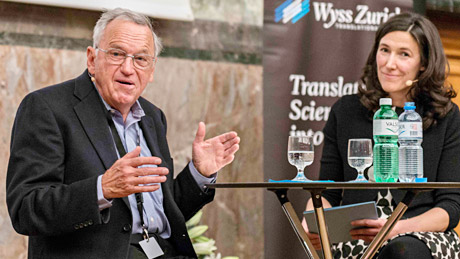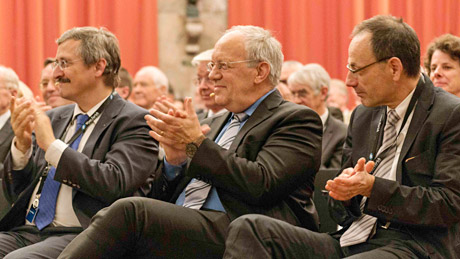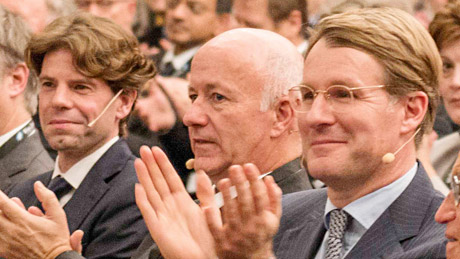Navigation auf uzh.ch
Navigation auf uzh.ch

Switzerland is one of world’s top locations for pure research. But it often takes a long time for basic scientific insights to be translated into new medical therapies or innovative products. Sometimes projects even have to be ditched on their way to clinical practice because of a lack of funding.
As co-directors Simon Hoerstrup (UZH) and Roland Siegwart (ETH Zurich) explained at Monday evening’s inauguration at the University of Zurich, the new Wyss Translational Center Zurich is designed to help bridge the “valley of death” between science on the one hand, and industry and clinical practice on the other.
The two institutions have been able to create the new center thanks to a generous USD 120 million donation from entrepreneur Hansjörg Wyss. The center will focus on promising areas of regenerative medicine and robotics.

The Wyss Translational Center Zurich – Wyss Zurich for short – has been in operation since March 2015. Four projects that have already been initiated were presented at the inauguration event. The aim of the Liver4Life project is to grow liver tissue outside the body until it’s big enough to replace the diseased section of the liver. The LifeMatrix project aims to use human cells to make artificial prostheses such as heart valves and blood vessels that grow with the recipient child’s body.
Scientists on the HeartOne project are developing technologies for improved ventricular assist devices (heart pumps). The Zurich Eye project is building robots that can navigate autonomously with the help of cameras, which could be used, for example, in vehicles and aircraft deployed in disaster areas. Wyss Zurich is also supporting other projects seeking new therapies for diabetes, spinal cord injury, and multiple sclerosis.
In addition to this, Wyss Zurich wants to support young, entrepreneurial teams, providing them with expert coaching from industry and business, and helping them build a network of potential industry partners and investors and set up their own spin-offs. The idea is to smooth the transition from the university to independence.
“The donation is an exceptional opportunity for the two universities to pool their expertise,” explained UZH President Michael Hengartner and ETH President Lino Guzzella in their joint address. While the two institutions are competitors in the hunt for research funding and the best researchers, “we’re also natural allies – with a long tradition,” said Hengartner. They founded their first joint institute back in 1971.
For several years UZH, ETH Zurich, and University Hospital Zurich have been stepping up collaboration on biomedical research under the umbrella of the Hochschulmedizin Zürich (HMZ) initiative. According to Lino Guzzella, Hochschulmedizin Zürich could be compared to a cruise liner, designed to support longer-term basic research in particular. The Wyss Center, by contrast, is a speedboat for research that’s ready to be translated into clinical practice. The new center will step into the breach especially in cases where there’s no interest on the part of the pharmaceutical industry.

“I want my donation to create an alternative to investors such as venture capitalists who cut off funding if they don’t see a return within five years,” explained Hansjörg Wyss at the inauguration. He’s aware that not every new project supported by the center will be a success, but concedes: “That’s the way life is. You can’t predict everything.”
Wyss grins as he sums up the motivation behind his donation, explaining that a few years ago he realized he was mortal and couldn’t take the money with him. And he quotes the US president Thomas Jefferson, who said that if life and your own efforts have made you rich you should give something back to society. The new UZH and ETH Zurich center isn’t Hansjörg Wyss’s first donation for Zurich research: he donated CHF 14 million towards the new campus at Balgrist University Hospital, which opened last week.
Swiss Federal Councilor Johann N. Schneider-Ammann praised Hansjörg Wyss’s initiative: “This is precisely the kind of commitment that Switzerland needs if it wishes to remain a strong location for research and innovation in the future.” He went on to stress that finding the right balance of competition and partnership between the universities was the key to success.